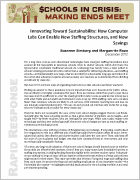Even as new educational technologies have emerged, staffing innovations have seemed all but impossible in American schools. Charter and district schools alike long ago surrendered to the notion that education requires at least as many core teachers as is determined from dividing enrollment by class size.
But a few new school designs suggest that we can fundamentally alter the basic schooling model, so that a given number of students can be taught well by fewer teachers who are leveraged in new ways. While some tasks require new technology and thus new technology staff, these new school designs are just as much staffing innovations as technological ones.
The innovations come with the promise of fundamental cost redesign. If schooling could indeed be reorganized to rely on a different mix of staff (typically, fewer teachers offset by more, lower-salaried lab aides), then district and charter leaders could alter the cost curve, stepping off the cycle of cost escalation and budget cuts that have consumed them in recent years, and onto more financially sustainable footing.
Of course, any large-scale adoption of these new school designs should depend most on whether the models are effective with students. Even if they are, many states have formidable barriers to staffing innovations, including funding formulas rigidly tied to student-teacher ratios.
Policymakers are unlikely to let go of some of those barriers without relevant evidence of what such reforms might mean for their states. This paper provides that evidence. Using real wage and staffing data from each state, we project the financial and staffing implications of one innovative school model—the Rocketship lab rotation—to highlight potential impacts on the schooling workforce and total per-student spending.
A related article by Marguerite Roza, To Survive, Charters Can’t Ignore the Bottom Line, was published by Education Next, June 26, 2012.




